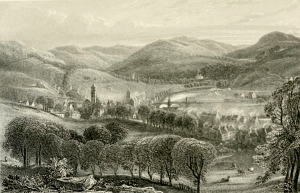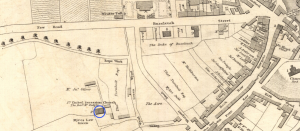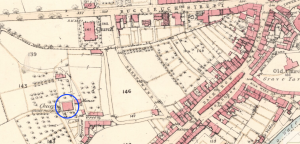
The final engagement of the abolitionists in Edinburgh was a lecture by George Thompson on ‘British India’ on Friday 30th October.1 The following day he and William Lloyd Garrison headed south to Carlisle, on their way to Liverpool, from where Garrison was due to sail home on Wednesday 4th.2
Frederick Douglass, however, had other plans. He probably stayed in Edinburgh a little longer, for he – and James Robertson, the Secretary of the Scottish Anti-Slavery Society – addressed a meeting in Hawick on Monday 2nd November. Not for the first time, he found that the church they had planned to speak at was closed to them: a hastily-convened meeting of the Deacons of the Relief Church the day before had decided to rescind the invitation. Fortunately, the United Secession minister Andrew Rodgie was able to offer his West-End Chapel as a last-minute alternative.


This was the only meeting addressed by Douglass in the Scottish Borders as far as we know. He did not even take the opportunity to visit Abbotsford, the baronial mansion that Walter Scott had built on the banks of the Tweed, as many other Americans did.3 The same month Margaret Fuller, reporting for the New York Tribune, implied that her ‘pilgrimage to Abbotsford’ was practically obligatory, and claimed that during the previous year, ‘five hundred Americans inscribed their names in its porter’s book.’4
Garrison, along with other delegates to the World Anti-Slavery Convention in London in 1840, had made the trip.5 And so had Douglass’ fellow campaigner Henry Clarke Wright, during his speaking tour of the Borders in the Spring. He was also pleased to note the existence of a ‘glorious motto’ over the entrance to Dryburgh Abbey, where Scott was buried: ‘No American to be allowed to enter here, if he is a slaveholder.’6
At the meeting James Robertson delivered the news, first broken in Edinburgh, that negotiations had begun to purchase Douglass’s freedom, and invited the audience to contribute to the funds already raised. Robertson spoke the next night too, but alone, as Douglass was already on his way to bid farewell to Garrison in Liverpool, having taken the morning coach south.
This was Douglass’ last appearance in Scotland for fourteen years. Although he wrote from Carlisle on 2 January, he probably did not cross the border as this was but a stage on a tour of the North of England that took in Newcastle, Sunderland, and Hexham.7
MEETINGS ON AMERICAN SLAVERY. THE FREE CHURCH AND THE EVANGELICAL ALLIANCE.
[Monday Meeting]
The Rev. Mr. Robertson, Secretary of the Anti-Slavery Society, Edinburgh, and Mr. Frederick Douglass, arrived in Hawick, per coach, on Monday afternoon, to address the people on the above interesting subjects. The barouche of Walter Wilson, Esq., was in waiting to convey them to Orchard, where they spent the evening. The meeting was first advertised to be held in the Relief Chapel, which was granted by the office-bearers authorized to let it, but, lo! on Sabbath afternoon, a conjoint meeting of the Session and Deacons was hurriedly, and no doubt irregularly, convened, at which, as will be seen from the following elegant document which is given verbatim, the deed of those appointed to this particular duty (viz., the Chairman, Treasurer, and Clerk to the congregation), was set aside, by a majority, we understand, of ten to eight, and the doors shut against the meeting, thus affording a direct insult to their own official servants, and also to the public generally:–
HAWICK, November 1, 1846.
SIR.– We are desired by the Elders and Managers of the Church to acquaint you, that the use of the Church cannot be granted for the meeting, as advertised to take place in the Church to-morrow evening in connection with American Slavery. The meeting conjointly regret the granting of the house by the sub-committee without the concurrence of the other managers. In future the elders and managers have agreed that the Meeting-House cannot be granted for any meeting unless previous notice by given, and the same be complied with.
We are, &c.,
Yours respectfully,
Signed WILLIAM DOUGLAS. ALEXANDER GOOLD.To Mr. John Cairns.
Fortunately there was one Church which was not shut against the fearless advocates of freedom to the slave. On the promoters of the meeting applying to the Rev. Mr. Rodgie, minister of the West-end Chapel, he most cheerfully consented, and even agreed to take the chair at the meeting. Notwithstanding the unfavourable circumstances above stated, by eight o’clock (the hour of the meeting) the Chapel was nearly filled with a most respectable audience. Among those present we observed the Rev. Mr. Thomson, Secession Minister, and his respected father, the Rev. Dr. Thomson of Coldstream, beside many of the most respectable and wealthy gentlemen of the place. The Rev. Mr. Rodgie, having been called to the chair, opened the proceedings by a few pertinent remarks on the evils of slavery, and passed a high eulogium on Mr. Frederick Douglas, whom he introduced to the meeting.
Mr. Douglas then came forward and spoke for nearly two hours, in a calm, cool, dignified, and impressive manner, that shewed him to be qualified above most men to command the attention of an audience, and to carry conviction in the minds of his hearers. The details he gave of the sufferings of his brethren the slaves of America, of which he was himself so long a witness and a sharer, were enough to arouse the just indignation of any man possessing common feelings, and were utterly repugnant to Christianity. From these harrowing details he passed on to the conduct of the Free Church in regard to the slave money: he spoke of the feelings of hope that came over him when he first heard that a deputation from a Free Church had arrived in America, and the bitter disappointment he was doomed to experience when he saw them enter the pulpits of slaveholding ministers, and there, with the image of God in chains before them, never utter a word of censure or rebuke for so horrid a crime against God and man. He pointed out the fallacious reasoning of Drs. Cunningham and Candlish in regard to the slave money and slave-holding in America, and succeeded in carrying conviction to his audience, that the worthy Drs., great though they may be, were kicking against the pricks. In the course of his address, Mr. Douglas took occasion to express his fears that the people of Scotland would fall away from the agitation which was now going on to abolish slavery. (‘Never, never,’ cried out several voices from different parts of the church.) Ah, said Mr. Douglas, look at your Relief Church, why are the doors of it shut against us; surely there is something wrong or this would not have been? During the course of his protracted address, Mr. Douglas was again and again cheered with an enthusiasm such as has rarely been witnessed here, and which shewed clearly that the very intelligent audience and he were at one on this most important subject.
The Rev. Mr. Robertson then addressed the meeting for nearly an hour. In the course of his address, he pointed to the Evangelical Alliance, on which he offered some strictures, but reserved himself to speak more fully on the subject on the following evening. Before retiring he submitted a resolution to the meeting, having reference to the subjects which had been introduced; this was seconded by a member of the Free Church. On suggestion, however, the resolution was not put, but was allowed to lie over till the following evening, so as to give an opportunity to the members of the Free Church to come forward and defend themselves if they choose. After the usual vote of thanks, the meeting broke up.
[Tuesday Meeting]
On Tuesday evening a second meeting was held in the West-end Chapel. The audience was addressed by the Rev. Mr Robertson, Mr Douglas having left for the south by the morning coach.
On this occasion Mr. Robertson dwelt at considerable length on the proceedings of the Free Church, or rather of its leaders, in regard to the slave money. He rebutted with much vigour and clearness the various arguments which, from time to time, have been brought forward by them to justify slavery in America, and their connection with man-stealers – pointed out the fallacy of a man being compelled to be a slaveholder, by throwing the blame on the Government – inquired if Dr. Cunningham himself would consent to be a slaveholder, were the Legislature of our country to pass a law condemning servants to slavery. He (Mr. Robertson) much doubted it, if we may judge from his conduct in regard to the Veto Act, which Government declared was opposed to the laws of the Church, but the Dr., rather than submit to these laws, left the Church. He then shewed that those who held communion with man-stealers might, with still more propriety, connect themselves with sheep-stealers and robbers. He produced evidence to shew that the slaveholding ministers of America and the Free Church of Scotland stood on the same footing in regard to the question of slavery. In speaking of the Evangelical Alliance, he clearly shewed where they had erred in admitting slaveholding ministers amongst them, but he hoped that body would yet be brought round, for he approved of union, though not with thieves and man-stealers.
At the conclusion of a most convincing speech, a resolution was submitted to the meeting, strongly disapproving of the conduct of the Free Church in their recent proceedings in connection with the slaveholding churches of America, and also of the Evangelical Alliance in receiving into their numbers ministers of slaveholding churches, and pledging the meeting never to cease agitating till the slaves were liberated, and the money sent back. On the resolution being put, it was carried without a single dissentient, though some time was allowed to elapse before asking for a shew of hands against it, but no amendment was forthcoming.
After the usual vote of thanks, a considerable number put down their names, with the view of forming an Anti-Slavery Society, and amongst them we noticed some most respectable gentlemen, who, if we may judge from the past, will act with determination and zeal whenever occasion requires it.
Kelso Chronicle, 6 November 1846
AMERICAN SLAVERY AND THE FREE CHURCH.– On Monday evening, a public meeting was held in the West End Meeting House, for the purpose of denouncing the intercourse of the Free Church of Scotland with the Slaveholding Churches of America. The house was well filled.
Mr Frederick Douglass, styled in the bills, ‘the eloquent and manly exponent of the wrongs of his suffering brethren in America,’ was the first to address the audience, which he did in a talented and eloquent speech, which occupied about two hours. He is a most excellent speaker, and an admirable mimic.
He was followed by the Rev. Mr Robertson* of Edinburgh, who blamed the deacons of the Relief Church for not granting them the use of their church after promising it. He went on to find fault with the Dundee Warder, the Edinburgh Witness, and the Border Watch newspapers, for hoodwinking their readers, and getting up a clamour about the Abolitionists being infidels, and holding peculiar views upon the Sabbath, all for the purpose of leading people away from the true facts of the case.
The meeting broke up about 11 o’clock; Mr Robertson stating that he would hold a meeting the following night, for the purpose of denouncing the Evangelical Alliance.
Mr Douglass’s speech was the same as he has delivered in Edinburgh, as reported in the papers. He was very severe upon Drs Candlish and Cunningham, but especially the former, holding him up to the ridicule of the audience, the majority of whom, we grieve to say, seemed to express ore hatred towards the Free Church than detestation of Slavery.
Mr R. lamented that a great number of the leaders of the Anti Slavery movement had drawn back and were no more seen upon the hustings at their meetings, – mentioning Drs Wardlaw and Alexander of the Independent body, and imputing it to the influence of the Free Church, forgetting that it was their own violence in this agitation that had made these men look cool upon them. Mr R. proposed a resolution, condemning the Free Church in holding Christian fellowship with slaveholders, and receiving blood-money from them, which was seconded; but he stated that as he intended addressing them upon the Evangelical Alliance, he would not divide the house then, but would do so on that occasion, so that if any belonging to the Free Church wished to make an amendment, they would have an opportunity of doing it then.
He likewise mentioned that he had a number of copies of Mr Douglas’s Life, written by himself, which he sold at half a crown each, and some copies of Messrs George Thomson & H. C. Wright’s addresses at Edinburgh, at 1s each.
A lady, he said, had written to Mr D’s late master in America, to see what he would give him his freedom for, and an answer had been returned, saying, that he could have it for L. 140. They had, accordingly, made a collection at a meeting in Edinburgh, which amounted to L. 4, 10s 31⁄2d; and if any felt inclined they might have an opportunity as they retired.
During the meeting, a person, holding infidel opinions, wished Mr Douglas to retract an expression he had used, to the effect that the Free Church leaders had acted as bad as infidels. The person said that infidels would not have taken the money. Mr Douglas said he had met some people holding infidel views who would have taken it, and others who would not.
[TUESDAY MEETING]
On Tuesday evening, another meeting was held in the same place. There was but a very thin attendance, the church being not half filled. Mr Robertson commenced again upon the Free Church. His speech was almost a repetition of what was said the night before. He again recurred to the Dundee Warder, Witness, and Border Watch newspapers, which, he said, misled their readers by getting them to follow the trail of a red herring.
After a great deal of abuse, levelled principally against the latter newspaper, he proceeded to read a number of extracts from George Thomson’s speeches upon the Evangelical Alliance, and strongly condemned that body for compromising the Slave Question to please the American ministers who were at the conference.
He began upon the Free Church at 8 o’clock, and spoke till ten minutes past 9 upon it, and then began to the Evangelical Alliance; but he returned to Dr Candlish, and gave him another quarter of an hour. Thus the Free Church had the lion’s share of the castigation. He said that the curse of God is resting upon the Free Church, and if the leaders do not immediately return the money no honest man can remain a member of it. He called upon all, having a regard for honesty and respectability, to leave it. In his opinion, there will soon be another disruption if they persisted in retaining the blood-money.
Before the meeting closed, he proposed a resolution, condemning the conduct of the Free Church and the Evangelical Alliance, and pledging those who voted for it to withdraw their support from the Free Church until they sent back the blood-money. No response being given, he put the resolution, when a good number of hands were held up. He then asked those who were opposed to it to hold up their hands, but as none did so, he declared the resolution carried.
He intimated that as they intended forming an Anti-Slavery Committee in Hawick, those feeling interested might stay after the meeting broke up. A vote of thanks was given to the minister and managers for the use of the church, and the meeting dismissed.
* Query. – Is this the Mr Robertson who figured so conspicuously at the meetings of the Total Abstinence Society in Edinburgh eight years ago, and who was the cause of so much strife and dissention among the members?
Border Watch and Galashiels Advertiser, 5 November 1846
Notes
-
- William Lloyd Garrison to Elizabeth Pease, Perth, 25 October 1846, in The Letters of William Lloyd Garrison. Volume 3: No Union with Slave-Holders, edited by Walter M. Merrill (Cambridge: Belknap Press of Harvard University Press, 1973), p.446. It is likely he and Douglass attended, but no newspaper of the lecture has been found.
- Ibid., p.446.
- At least his name does not appear in the house’s visitor book for the period. I am grateful for this information to Eve Morley, Collections and Engagement Assistant, The Abbotsford Trust (email, 25 March 2019).
- Margaret Fuller, At Home and Abroad; or Things and Thoughts in America and Europe (Boston: Brown, Taggard and Chase, 1860), ‘Letter VI’ (Paris, November 1846) p. 163; ‘Letter III’ (Edinburgh, 20 September 1846), p. 137.
- Nathaniel P. Rogers, ‘Ride into Edinburgh’, in A Collection from the Newspaper Writings of Nathaniel Peabody Rogers (Concord, MA: John R. French, 1847), pp. 113-15. See also James Mott, Three Months in Great Britain (Philadelphia: J. Miller M’KIm, 1841), p. 73; Mott, Slavery and ‘The Woman Question’: Lucretia Mott’s Diary of Her Visit to Great Britain to Attend the World’s Anti-Slavery Convention of 1840, ed. Frederick B. Tolles (Haverford, PA: Friends’ Historical Association, 1952), pp. 72–3.
- Henry Clarke Wright to William Lloyd Garrison, Melrose, 28 March 1846, Liberator, 1 May 1846. The notice must have been there some time: see ‘A Prohibition to Slaveholders,’ Illustrated London News, 18 January 1845; and G.A.S., Notes of Travel at Home: During a Month’s Tour in Scotland and England (London: Simpkin, Marshall & Co., 1846), p. 30.
- For further background see Alastair M. Redpath’s three articles on ‘Hawick and Slavery’, Hawick Paper, 1, 8 and 15 March, 2019.